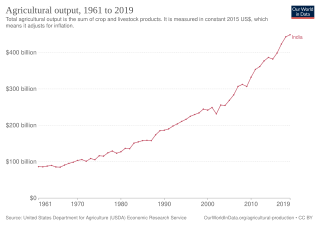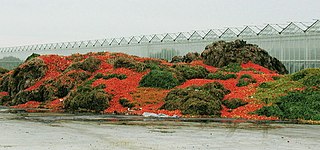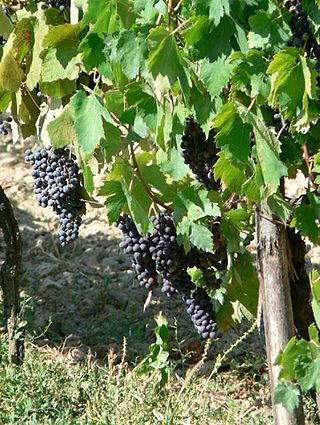
A grocery store (AE), grocery shop (BE) or simply grocery is a retail store that primarily retails a general range of food products, which may be fresh or packaged. In everyday U.S. usage, however, "grocery store" is a synonym for supermarket, and is not used to refer to other types of stores that sell groceries. In the UK, shops that sell food are distinguished as grocers or grocery shops
Agribusiness is the industry, enterprises, and the field of study of value chains in agriculture and in the bio-economy, in which case it is also called bio-business or bio-enterprise. The primary goal of agribusiness is to maximize profit while satisfying the needs of consumers for products related to natural resources. Agribusinesses comprise farms, food and fiber processing, forestry, fisheries, biotechnology and biofuel enterprises and their input suppliers.

An Agricultural Produce Market Committee (APMC) is a marketing board established by state governments in India to ensure farmers are safeguarded from exploitation by large retailers, as well as ensuring the farm to retail price spread does not reach excessively high levels. APMCs are regulated by states through their adoption of a Agriculture Produce Marketing Regulation (APMR) Act.
The Mysore plateau, also known as the South Karnataka plateau, is a plateau that is one of the four geographically unique regions of the Indian state of Karnataka. It has many undulations and is bounded on the west and south by the Western Ghats. Most of the river Kaveri flows through Karnataka in the Mysore Plateau. The average elevation in the region is between 600 and 900 meters. The plateau covers the districts of Bangalore, Bangalore Rural, Chamarajanagar, Hassan, Kodagu, Kolar, Mandya, Mysore and Tumkur.
Lasalgaon is a census town in Nashik District in the Indian state of Maharashtra.

The history of agriculture in India dates back to the Neolithic period. India ranks second worldwide in farm outputs. As per the Indian economic survey 2020 -21, agriculture employed more than 50% of the Indian workforce and contributed 20.2% to the country's GDP.

Karnataka is one of the highest economic growth states in India with an expected GSDP growth of 9.5% in the 2021–22 fiscal year. The total expected GSDP of Karnataka in 2022–2023 is about $240 billion. Karnataka recorded the highest growth rates in terms of GDP and per capita GDP in the last decade compared to other states. In 2008–09, the tertiary sector contributed the most to GSDP, followed by the secondary sector, and the primary sector.
M. H.. Marigowda(Maragowdanahalli Hombegowda marigowda) is also known as Father of Horticulture in Karnataka.

Retailing in India is one of the pillars of its economy and accounts for about 10 percent of its GDP. The Indian retail market is estimated to be worth $1.3 trillion as of 2022. India is one of the fastest growing retail markets in the world, with 1.4 billion people.

Agriculture in Lebanon is the third most productive sector in the country after the tertiary and industrial sectors. It contributes 3.1% of GDP and 8 percent of the effective labor force. The sector includes an informal Syrian labor and is dependent on foreign labor for its productivity. Main crops include cereals, fruits and vegetables, olives, grapes, and tobacco, along with sheep and goat herding. Mineral resources are limited and are only exploited for domestic consumption. Lebanon, which has a variety of agricultural lands, from the interior plateau of the Beqaa Valley to the narrow valleys leading downward to the sea, enables farmers to grow both European and tropical crops. Tobacco and figs are grown in the south, citrus fruits and bananas along the coast, olives in the north and around the Shouf Mountains, and fruits and vegetables in the Beqaa Valley. More exotic crops include avocados, grown near Byblos, and hashish. Although the country benefits from favorable farming conditions and diverse microclimates, it relies on food imports, which make up 80% of its consumption.
Amruthur is a town (hobli) in Kunigal taluk, Tumkur district, Karnataka, India. It is situated in a valley created by the rivers Shimsha, Veera-vaishnavi and Nagini. It is irrigated by the Markonhalli and Mangala reservoirs and a series of tanks. Amruthur is surrounded by paddy fields and areca-nut gardens. To the south of the village are two lakes that also serve as a source of irrigation.

Post-harvest losses of vegetables and fruits occur at all points in the value chain from production in the field to the food being placed on a plate for consumption. Post-harvest activities include harvesting, handling, storage, processing, packaging, transportation and marketing.
University of Horticultural Sciences, Bagalkot is a public university dedicated to the study and research of Horticultural Sciences established by the Government of Karnataka at Bagalkot district.
The cooperative movement in India plays a crucial role in the agricultural sector, banking and housing. The history of cooperatives in India is more than a hundred years old. Cooperatives developed very rapidly after Indian independence. According to an estimate, more than half a million cooperative societies are active in the country. Many cooperative societies, particularly in rural areas, increase political participation and are used as a stepping stone by aspiring politicians.

The Indian Institute of Horticultural Research (IIHR) is an autonomous organization acting as a nodal agency for basic, strategic, anticipatory and applied research on various aspects of horticulture such as fruits, vegetable, ornamental, medicinal and aromatic plants and mushrooms in India. The institute has its headquarters in Bengaluru, Karnataka, India and is a subsidiary of Indian Council of Agricultural Research (ICAR), New Delhi, under the Ministry of Agriculture, India. It recently has been ranked 1st for the combined years 2019-20 and 2020–21 by the ICAR.
Abdul Rauf Abdulkarim Shaikh is a progressive farmer, residing near Banavasi, Karnataka, India who is known for innovative cultivation of pineapple and he is conferred with honorary doctorate by University of Agricultural Sciences, Dharwad, for his achievement in horticulture.

Bangalore blue grape, also simply called Bangalore Blue, is a variety of fox grape grown in districts around Bangalore in India. It is one of the three major varieties of grape in the state of Karnataka. It received a geographical indication tag from the Government of India in 2013.
The horticulture industry embraces the production, processing and shipping of and the market for fruits and vegetables. As such it is a sector of agribusiness and industrialized agriculture. Industrialized horticulture sometimes also includes the floriculture industry and production and trade of ornamental plants.
The Totgars' Cooperative Sale Society Limited is a farmer's co-operative founded in 1923. It is located in Sirsi taluka of Uttara Kannada district of Karnataka an Indian state. The society had 23,000 members as mentioned in an end of 2016 news story. It is the second oldest betel nut cooperative in Karnataka.
Operation Greens is a project approved by the Ministry of Food Processing Industries with the target to stabilise the supply of tomato, onion and potato crops in India, as well as to ensure their availability around the country, year-round without price volatility. It was first introduced in the 2018-2019 Union budget of India, and has been allocated Rs 500 crores to promote farmer producers' organisations (FPOs), agri-logistics, processing facilities and professional management.









